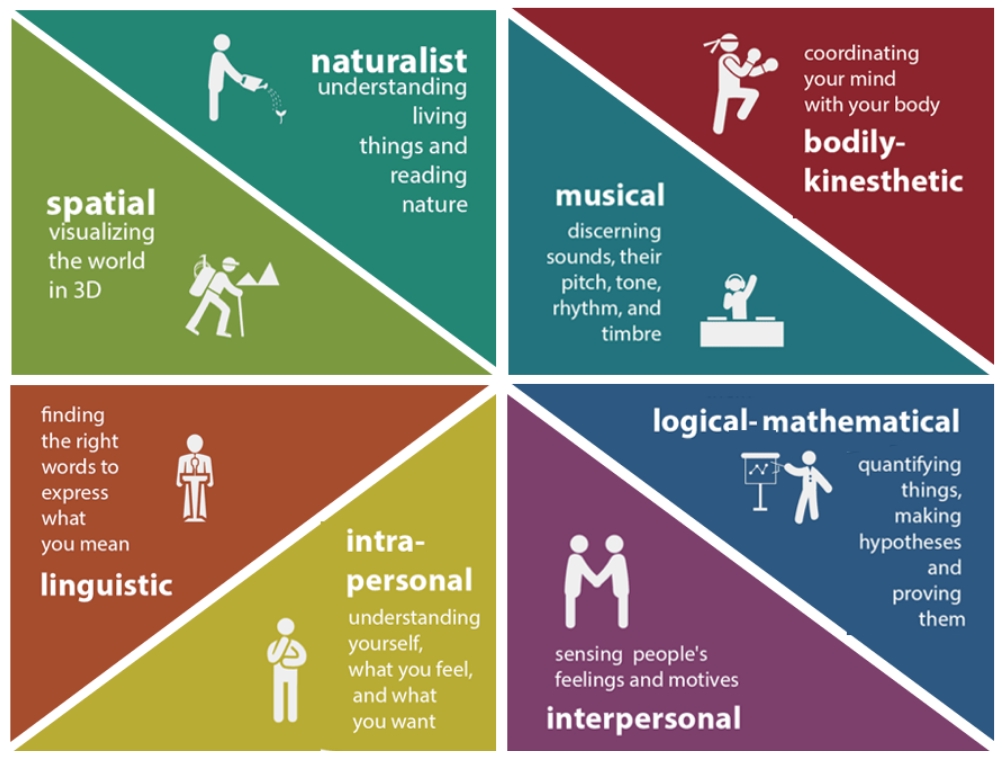Gymnastics & Trampoline makes kids smarter. Fact.
Have you every heard someone say that there are “Book-Smarts” and “Street-Smarts” usually defending someone who may be a little slow on the uptake for one or the other? It turns out, that according to developmental psychologist and researcher Howard Gardner there are actually 8 kinds of intelligences.
Gardner’s theory explains that what we commonly refer to as intelligence is just a conglomeration of what he calls “G” or general intelligence and is focused mainly on cognition. In his book Frames of Mind, Gardner claims that judging intelligence on a sliding scale common for all people is an injustice and doesn’t take into account if a person is strong in some areas and less so in others. Traditionally people are either smart or not. In reality his theory explains that a person may have strength in a particular facet of intelligence, and it may make them perfect for a job or position, while others may not be as predisposed.

- Logical-Mathematical (number- smart): This is people with a strength in math, logic, organization and problem solving. They would be great accountants or computer analysts.
- Linguistic (word-smart): These people are good with words. Written, spoken, learning vocabulary, and speaking other languages are all strengths in this area. These are the writers, poets, journalists, and lecturers.
- Interpersonal (people-smart): These are the people who are good at reading social norms and cues. They tune in well to other people. People high in this area are great teachers, managers or sales people.
- Body-Kinesthetic (body-smart); People who understand their own performance and the actions of others are good creators and problem solvers in terms of physical things. Usually this is people who are athletes, mechanics, coaches, and physical therapists.
- Musical (music-smart): People who are music-smart have an innate understanding of rhythm and patterns. It’s applied highly by musicians, composers, and designers.
- Spatial (picture- smart): These are the architects, artists, pilots and even surgeons. They understand and can manipulate patterns in large or small space. They are very detail oriented.
- Intrapersonal (self-smart): These people are goal setters and introspective. They “get” what they are thinking and feeling and can relate it to the world and society. Therapists, counselors, entrepreneurs, and clergy are high in this area.
- Naturalistic (nature-smart): People who understand and relate to flora and fauna, and the environment are naturalistically smart. Meteorologists, botanists, and geologists are nature smart.
As you see, if we, rather than classifying a person as smart or not, or even book or street smart, would be better served if we read people as having predilections toward specific areas. This allows people to develop in their own strengths and actually succeed on their own scale. There is a great book called StrengthFinders, that administers a test indicating the reader’s 5 areas of strength. Our society always focuses on having us bring up our lowest scores in any area rather than leading us to focus on our strengths. To build upon strengths, we must first identify where we are strong. If we could encourage people to develop their preferred “intelligence” we would have people finding career paths that deliver inevitable success, and more importantly, people feeling happier.
Einstein is (mistakenly?) credited with saying “if you judge a fish by its ability to climb a tree, it will live its whole life believing that it is stupid.” I think that he is really on to something. Not everyone is the same and so it makes no sense to use a standardized measure for intelligence.
Now, why am I writing about this? Because another facet of Gardner’s work indicates that gymnastics and trampoline are crucial in developing Intrapersonal, Kinesthetic, and Spatial intelligence. By having a young child bounce, swing, and roll, the brain develops new neural pathways that reinforce cognitive development. That means that gymnastics is beneficial for over 37% of all intelligences. It’s not me; it’s SCIENCE! and I thought you would want to know.

